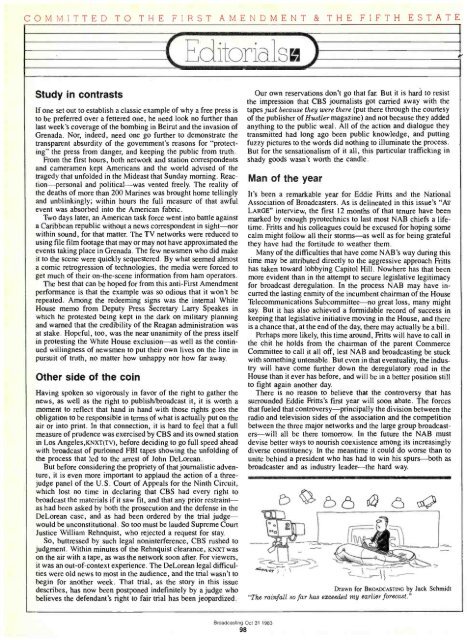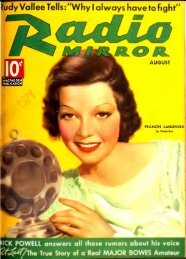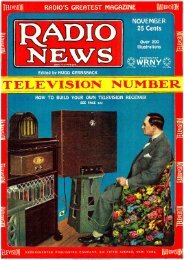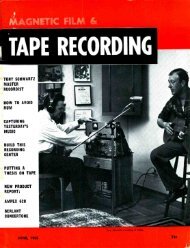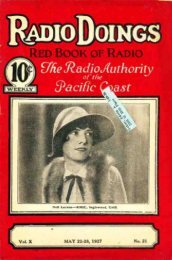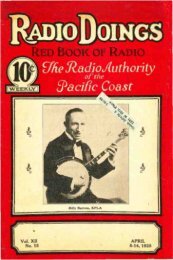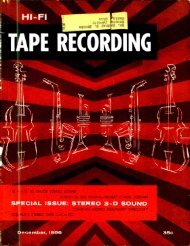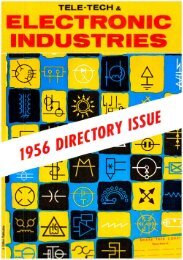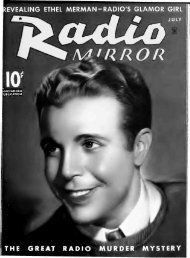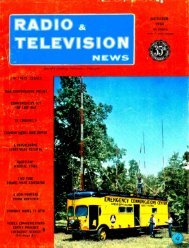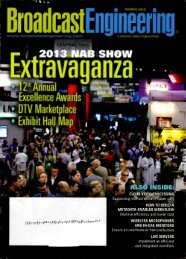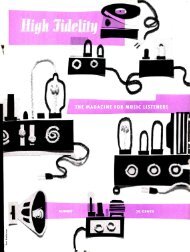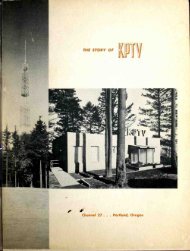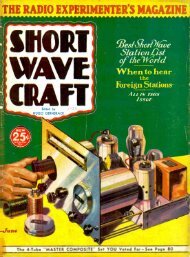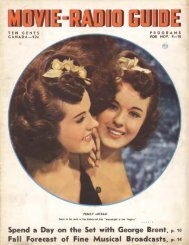Broadcasting Oct 31 - American Radio History
Broadcasting Oct 31 - American Radio History
Broadcasting Oct 31 - American Radio History
You also want an ePaper? Increase the reach of your titles
YUMPU automatically turns print PDFs into web optimized ePapers that Google loves.
'OMMITTED TO THE FIRST AMENDMENT & THE FIFTH ESTATE<br />
Study in contrasts<br />
If one set out to establish a classic example of why a free press is<br />
to be preferred over a fettered one, he need look no further than<br />
last week's coverage of the bombing in Beirut and the invasion of<br />
Grenada. Nor, indeed, need one go further to demonstrate the<br />
transparent absurdity of the government's reasons for "protect-<br />
ing" the press from danger, and keeping the public from truth.<br />
From the first hours, both network and station correspondents<br />
and cameramen kept <strong>American</strong>s and the world advised of the<br />
tragedy that unfolded in the Mideast that Sunday morning. Reac-<br />
tion- personal and political -was vented freely. The reality of<br />
the deaths of more than 200 Marines was brought home tellingly<br />
and unblinkingly; within hours the full measure of that awful<br />
event was absorbed into the <strong>American</strong> fabric.<br />
'No days later, an <strong>American</strong> task force went into battle against<br />
a Caribbean republic without a news correspondent in sight -nor<br />
within sound, for that matter. The TV networks were reduced to<br />
using file film footage that may or may not have approximated the<br />
events taking place in Grenada. The few newsmen who did make<br />
it to the scene were quickly sequestered. By what seemed almost<br />
a comic retrogression of technologies, the media were forced to<br />
get much of their on- the -scene information from ham operators.<br />
The best that can be hoped for from this anti -First Amendment<br />
performance is that the example was so odious that it won't be<br />
repeated. Among the redeeming signs was the internal White<br />
House memo from Deputy Press Secretary Larry Speakes in<br />
which he protested being kept in the dark on military planning<br />
and warned that the credibility of the Reagan administration was<br />
at stake. Hopeful, too, was the near unanimity of the press itself<br />
in protesting the White House exclusion -as well as the contin-<br />
ued willingness of newsmen to put their own lives on the line in<br />
pursuit of truth, no matter how unhappy nor how far away.<br />
Other side of the coin<br />
Having spoken so vigorously in favor of the right to gather the<br />
news, as well as the right to publish/broadcast it, it is worth a<br />
moment to reflect that hand in hand with those rights goes the<br />
obligation to be responsible in terms of what is actually put on the<br />
air or into print. In that connection, it is hard to feel that a full<br />
measure of prudence was exercised by CBS and its owned station<br />
in Los Angeles,KNxTft'v), before deciding to go full speed ahead<br />
with broadcast of purloined FBI tapes showing the unfolding of<br />
the process that led to the arrest of John DeLorean.<br />
But before considering the propriety of that journalistic adven-<br />
ture, it is even more important to applaud the action of a three -<br />
judge panel of the U.S. Court of Appeals for the Ninth Circuit,<br />
which lost no time in declaring that CBS had every right to<br />
broadcast the materials if it saw fit, and that any prior restraint -<br />
as had been asked by both the prosecution and the defense in the<br />
DeLorean case, and as had been ordered by the trial judge -<br />
would be unconstitutional. So too must be lauded Supreme Court<br />
Justice William Rehnquist, who rejected a request for stay.<br />
So, buttressed by such legal noninterference, CBS rushed to<br />
judgment. Within minutes of the Rehnquist clearance, cNxTwas<br />
on the air with a tape, as was the network soon after. For viewers,<br />
it was an out -of- context experience. The DeLorean legal difficul-<br />
ties were old news to most in the audience, and the trial wasn't to<br />
begin for another week. That trial, as the story in this issue<br />
describes, has now been postponed indefinitely by a judge who<br />
believes the defendant's right to fair trial has been jeopardized.<br />
H dito- qalso<br />
<strong>Broadcasting</strong> <strong>Oct</strong> <strong>31</strong> 1983<br />
98<br />
Our own reservations don't go that far. But it is hard to resist<br />
the impression that CBS journalists got carried away with the<br />
tapes just because they were there (put there through the courtesy<br />
of the publisher of Hustler magazine) and not because they added<br />
anything to the public weal. All of the action and dialogue they<br />
transmitted had long ago been public knowledge, and putting<br />
fuzzy pictures to the words did nothing to illuminate the process.<br />
But for the sensationalism of it all, this particular trafficking in<br />
shady goods wasn't worth the candle.<br />
Man of the year<br />
It's been a remarkable year for Eddie Fritts and the National<br />
Association of Broadcasters. As is delineated in this issue's "AT<br />
LARGE" interview, the first 12 months of that tenure have been<br />
marked by enough pyrotechnics to last most NAB chiefs a life-<br />
time. Fritts and his colleagues could be excused for hoping some<br />
calm might follow all their storms -as well as for being grateful<br />
they have had the fortitude to weather them.<br />
Many of the difficulties that have come NAB's way during this<br />
time may be attributed directly to the aggressive approach Fritts<br />
has taken toward lobbying Capitol Hill. Nowhere has that been<br />
more evident than in the attempt to secure legislative legitimacy<br />
for broadcast deregulation. In the process NAB may have in-<br />
curred the lasting enmity of the incumbent chairman of the House<br />
Telecommunications Subcommittee -no great loss, many might<br />
say. But it has also achieved a formidable record of success in<br />
keeping that legislative initiative moving in the House, and there<br />
is a chance that, at the end of the day, there may actually be a bill.<br />
Perhaps more likely, this time around, Fritts will have to call in<br />
the chit he holds from the chairman of the parent Commerce<br />
Committee to call it all off, lest NAB and broadcasting be stuck<br />
with something untenable. But even in that eventuality, the indus-<br />
try will have come further down the deregulatory road in the<br />
House than it ever has before, and will be in a better position still<br />
to fight again another day.<br />
There is no reason to believe that the controversy that has<br />
surrounded Eddie Fritts's first year will soon abate. The forces<br />
that fueled that controversy - principally the division between the<br />
radio and television sides of the association and the competition<br />
between the three major networks and the large group broadcast-<br />
ers -will all be there tomorrow. In the future the NAB must<br />
devise better ways to nourish coexistence among its increasingly<br />
diverse constituency. In the meantime it could do worse than to<br />
unite behind a president who has had to win his spurs -both as<br />
broadcaster and as industry leader -the hard way.<br />
Drawn for BROADCASTING by Jack Schmidt<br />
"The rainfall so far has exceeded my earlier forecast."


